Exploring the Importance of Mosquito Lab Analysis
When the public observes a Vector Disease Control International (VDCI) truck conducting spraying, it may appear routine, or even go unnoticed. However, what many folks don’t realize is the meticulous planning and scientific precision that is calculated for each spray route. Behind the scenes, a dedicated team of experts ensures every decision, from location selection to insecticide dosage and spray time, is backed by rigorous research and analysis.
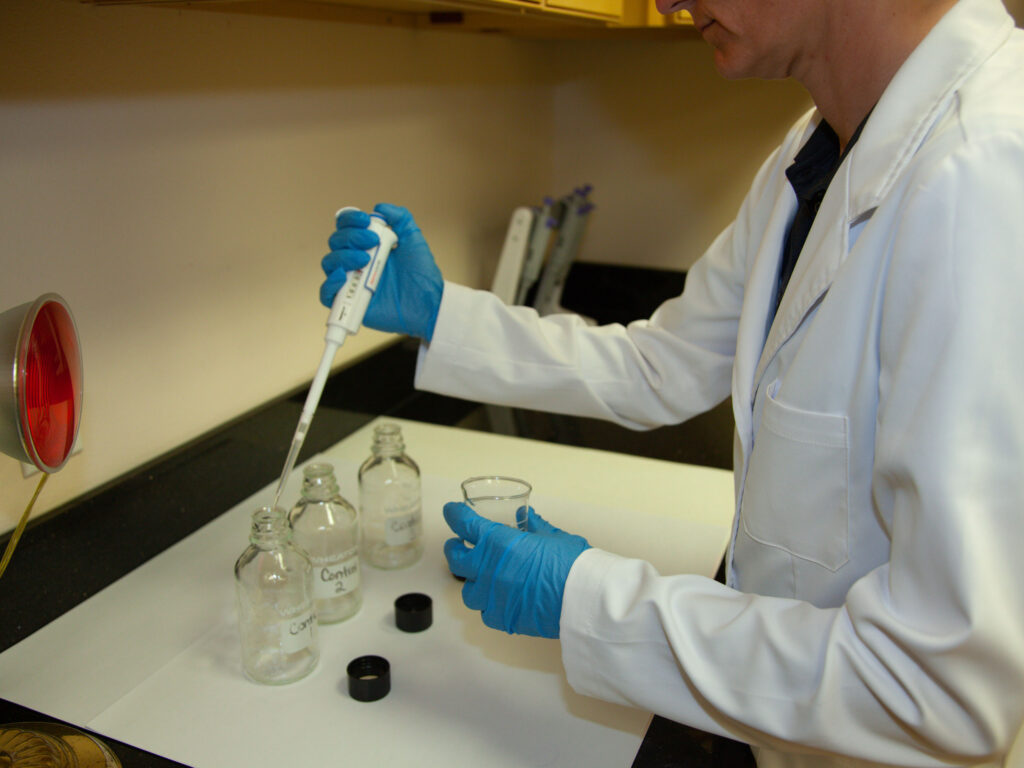
“Most people are only familiar with the trucks and may not realize there’s a lot more to mosquito control,” Jennifer Riley, VDCI’s Louisiana-based biologist and lab technician said. “I think people would be surprised to learn that there is someone in the lab every day to help ensure the efficacy of our operations.”
Evaluating Mosquito Larvae for Insecticide Resistance
Jennifer specializes in monitoring for larval and adult insecticide resistance, the process by which mosquitoes become less susceptible to insecticides used to control them, either through genetic mutations or behavioral changes. Overuse or unnecessary spraying of insecticides can contribute to the development of resistance.
To evaluate mosquito larval resistance, Jennifer visits different locations in her jurisdiction to conduct field tests directly on-site. Using tools like mosquito dippers, she quantifies the larval presence in ditches, containers, or other sites where water has pooled. She then calculates and administers a precise larvicide dosage to the water, returning approximately 24 hours later to evaluate the efficacy of the product and identify any signs of resistance.
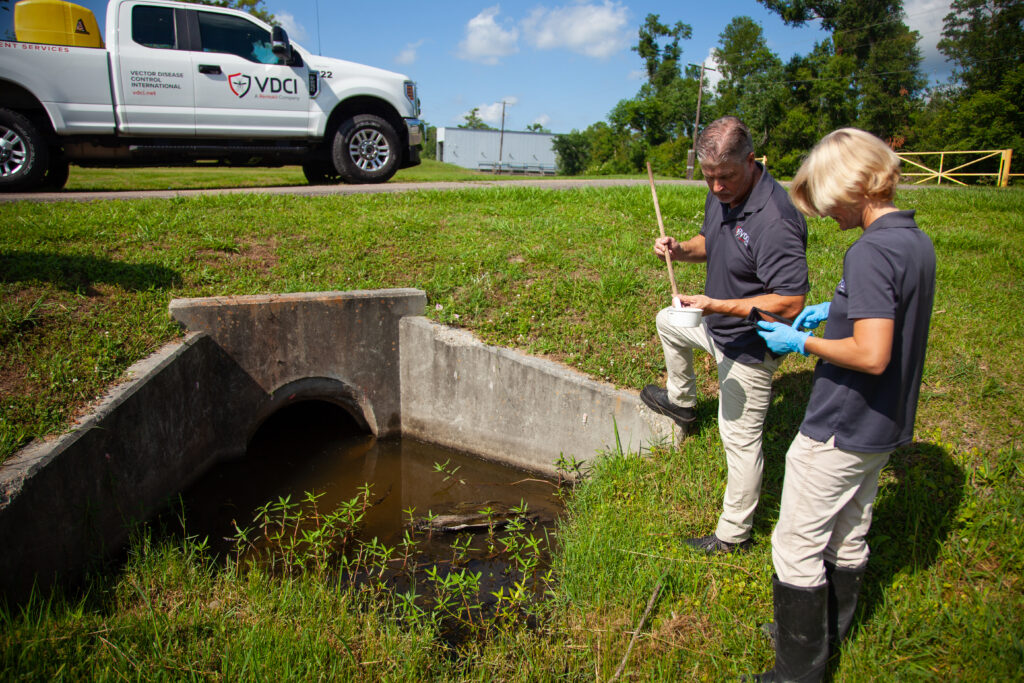
“Sometimes it’s hard to find breeding locations and I can be out all day looking for sampling sites,” Jennifer said. “I joke that I’m the only one who gets excited when mosquitoes start breeding again after winter. It’s such a thrill to find one of those really busy ditches.”
Testing Adult Mosquitoes for Insecticide Resistance
Jennifer also collects mosquito larvae and rears them to adults in the lab for testing adulticide resistance. The mosquitoes are kept in a warm, humid enclosure called an insectarium to maintain their health and vitality until they’re ready for testing. Artificial lights are regulated to mirror day and night cycles, and they’re provided with sugar water to mimic the nectar they feed on when not seeking blood meals.
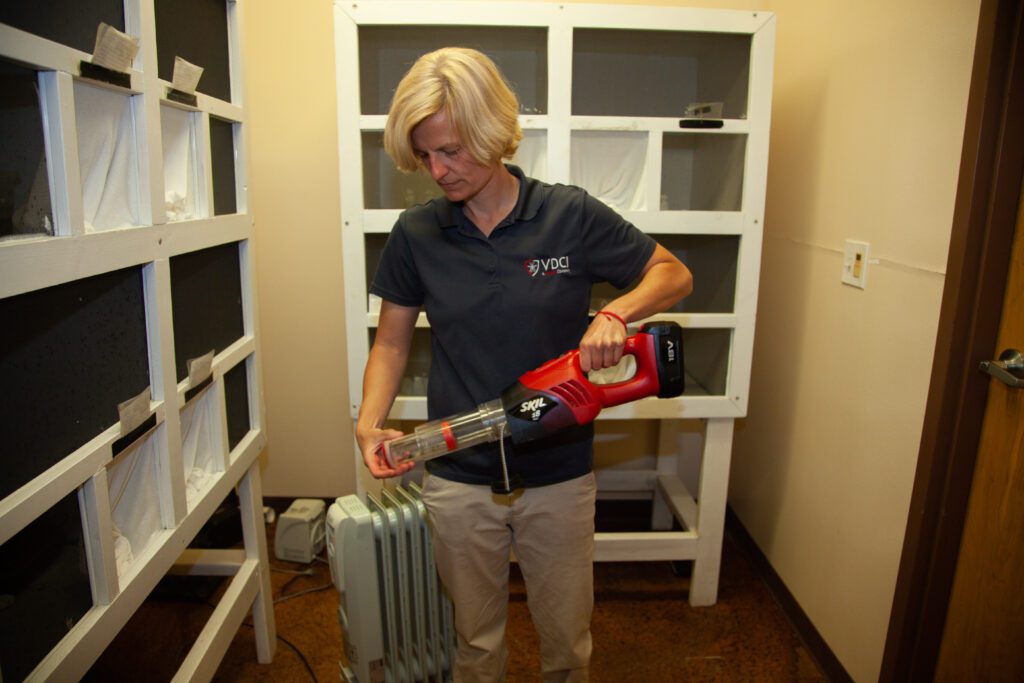
“It’s crucial to replicate the environmental conditions they’re familiar with to prevent results from being skewed,” Jennifer explained.
Adulticide tests are conducted in the lab with the CDC bottle bioassay. To protect their delicate wings, mosquitoes are gently aspirated from the insectarium and transferred into bottles containing a diluted adulticide solution for observation. Mortality rates are then compared to a control group to detect any signs of insecticide resistance.
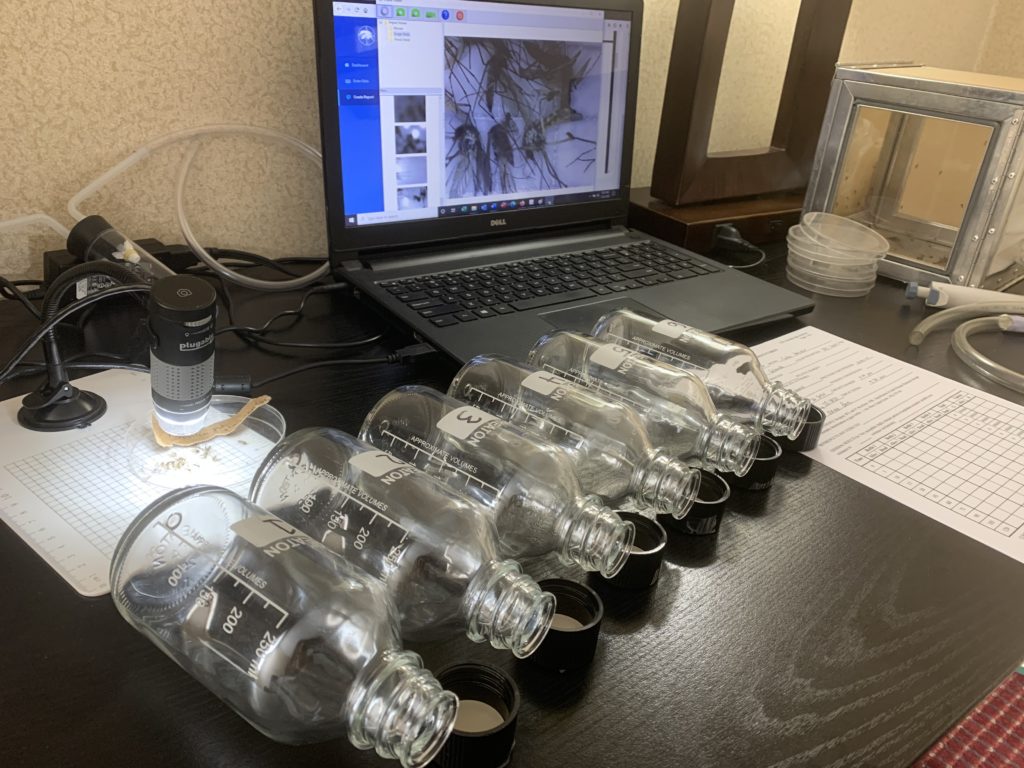
Adulticide tests are also conducted in the field to replicate real-world conditions in which a nighttime spray mission would occur. This helps to account for variables like air pressure, humidity, wind, and temperature. Adult mosquitoes are placed in containers at various intervals within a range of a few hundred feet. A passing truck sprays adulticide and a post-spray mosquito examination determines mortality rates. These tests ensure that the truck’s speed and spray droplet size are appropriate to target mosquitoes while minimizing the impact on non-target insects and wildlife.
What Happens When Insecticide Resistance Is Detected?
If insecticide resistance is detected in any of these assessments, the next step is to determine how far the resistant population has spread beyond the initial testing site. This may involve placing adult mosquito traps at strategic intervals for additional testing or collecting larval samples from other sites in the surrounding area.
“After I’ve identified a potential problem, we want to see how big the problem really is,” Jennifer said. “Then, we may discuss rotating insecticide products or altering the formula to ensure our efforts remain safe and effective.”
In addition to rigorously monitoring and testing for insecticide resistance, Jennifer provides support to other experts involved with mosquito species identification, population counting, and disease testing. This collaborative, science-backed approach helps ensure insecticides are only sprayed in the right locations, in the right dosages, at the right times.
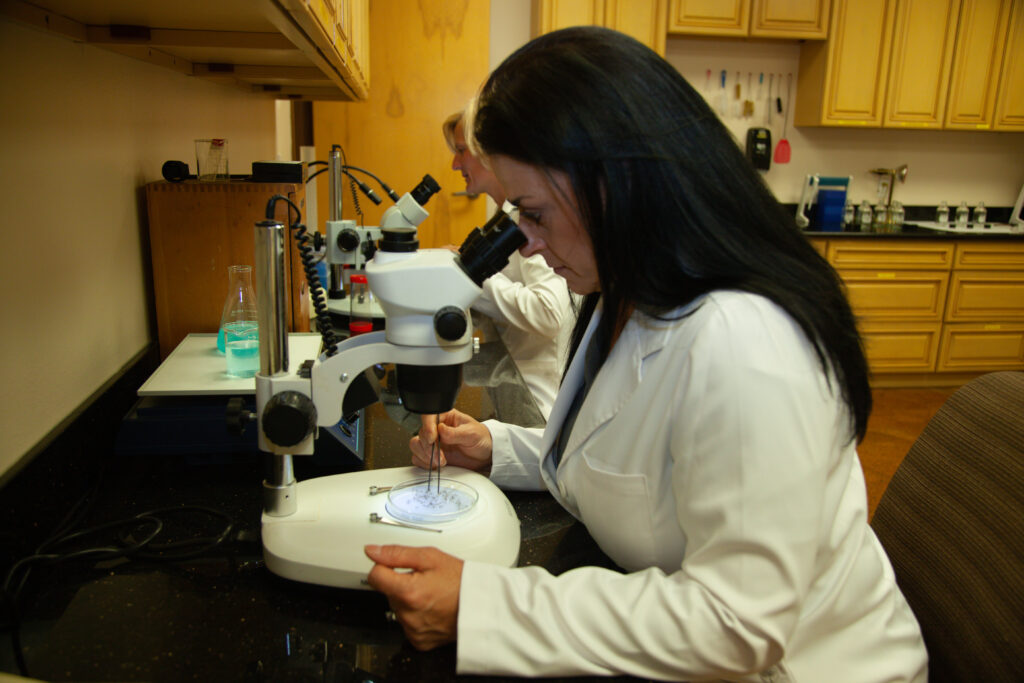
Her job is not without its challenges. Environmental factors complicate the task of locating mosquito larvae in the field. In droughts, mosquito populations may surge despite the scarcity of water, making it more difficult to locate breeding sites. Conversely, heavy rainfall can completely wash away larvae habitats, preventing accurate sampling.
Encounters with unwanted creatures—inside and outside of the lab—are also a possibility.
“Once, I was sampling larvae in a septic ditch. Just as I went to reach in, I was fortunate to notice there was an alligator,” Jennifer said. “Spiders have also hatched in the insectarium and I have to figure out how to keep them from eating all of my insects.”
Despite these challenges, Jennifer likes that her job is never boring.
“Every day is a little different. I love lab work, but I also like being out looking for larvae and seeing the beauty of the state. It’s a great balance for me.”
Contact Our Experts
Complete the form below or call us at 800-413-4445 to speak to an expert about your mosquito management needs.
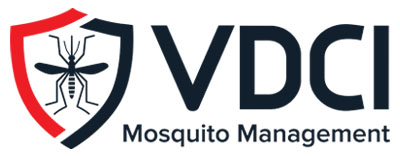 Since 1992, Vector Disease Control International (VDCI) has taken pride in providing municipalities, mosquito abatement districts, industrial sites, planned communities, homeowners associations, and golf courses with the tools they need to run effective mosquito control programs. We are determined to protect the public health of the communities in which we operate. Our mosquito control professionals have over 100 years of combined experience in the field of public health, specifically vector disease control. We strive to provide the most effective and scientifically sound mosquito surveillance and control programs possible based on an Integrated Mosquito Management approach recommended by the American Mosquito Control Association (AMCA) and Centers for Disease Control and Prevention (CDC). VDCI is the only company in the country that can manage all aspects of an integrated mosquito management program, from surveillance to disease testing to aerial application in emergency situations.
Since 1992, Vector Disease Control International (VDCI) has taken pride in providing municipalities, mosquito abatement districts, industrial sites, planned communities, homeowners associations, and golf courses with the tools they need to run effective mosquito control programs. We are determined to protect the public health of the communities in which we operate. Our mosquito control professionals have over 100 years of combined experience in the field of public health, specifically vector disease control. We strive to provide the most effective and scientifically sound mosquito surveillance and control programs possible based on an Integrated Mosquito Management approach recommended by the American Mosquito Control Association (AMCA) and Centers for Disease Control and Prevention (CDC). VDCI is the only company in the country that can manage all aspects of an integrated mosquito management program, from surveillance to disease testing to aerial application in emergency situations.

